Book2 Unit 3 P4作课
高中英语 Book 2 Unit 3 computers warming up and Sk
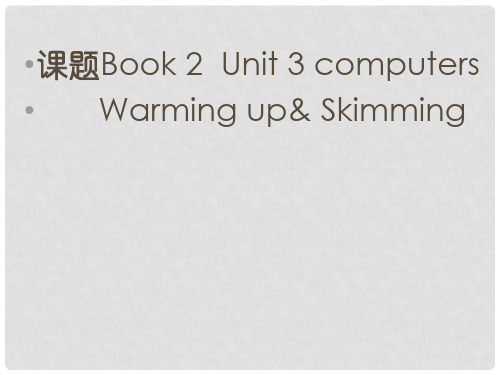
? Internet
universal machine laptop/ notebook)
PC
Let me show some to you.
The whole class will be divided into 3 groups ,and each group send a student to stand before the platform , who guess what the object is and the rest of the group mates try to describe them (no movements) to let his or her group representative guess what the object is and the group mates who guess the object must use the following expressions:
I think it is…… In my opinion, it is…… I believe it is…… ……
1. I am a machine which is a good helper in doing house work. I wash clothes for people. Who am I?
c) pocket c) site c) sign c) load c) toy c) late c) system
What are the whole names of the followings?
1. PC: Personal computer 2. IT: Information technology 3. DVD: Digital video disc 4. W.W.W: World Wide Web 5. 科学技术:Science and technology 6. 人工智能: Artificial Intelligence 7. 笔记本电脑:Notebook computer
高二英语Book2 Unit3 Computers (reading)课件

Thank you very much!
9、静夜四无邻,荒居旧业贫。。*** 10、雨中黄叶树,灯下白头人。。**** 11、以我独沈久,愧君相见频。。***** 12、故人江海别,几度隔山川。。**** 13、乍见翻疑梦,相悲各问年。。***** 14、他乡生白发,旧国见青山。。**** 15、比不了得就不比,得不到的就不要。。。***** 16、行动出成果,工作出财富。。*** 17、做前,能够环视四周;做时,你只能或者最好沿着以脚为起点的射线向前。。**** 9、没有失败,只有暂时停止成功!。*** 10、很多事情努力了未必有结果,但是不努力却什么改变也没有。。**** 11、成功就是日复一日那一点点小小努力的积累。。***** 12、世间成事,不求其绝对圆满,留一份不足,可得无限完美。。**** 13、不知香积寺,数里入云峰。。***** 14、意志坚强的人能把世界放在手中像泥块一样任意揉捏。**** 15、楚塞三湘接,荆门九派通。。。***** 16、少年十五二十时,步行夺得胡马骑。。*** 17、空山新雨后,天气晚来秋。。**** 9、杨柳散和风,青山澹吾虑。。*** 10、阅读一切好书如同和过去最杰出的人谈话。**** 11、越是没有本领的就越加自命不凡。***** 12、越是无能的人,越喜欢挑剔别人的错儿。**** 13、知人者智,自知者明。胜人者有力,自胜者强。***** 14、意志坚强的人能把世界放在手中像泥块一样任意揉捏。**** 15、最具挑战性的挑战莫过于提升自我。。***** 16、业余生活要有意义,不要越轨。*** 17、一个人即使已登上顶峰,也仍要自强不息。****
感谢您的下载观看
MOMODA POWERPOINT
Lorem ipsum dolor sit amet, consectetur adipiscing elit. Fusce id urna blandit, eleifend nulla ac, fringilla purus. Nulla iaculis tempor felis ut cursus.
新教材 人教版高中英语必修第二册 unit3 The internet 精品教学课件(共142页)
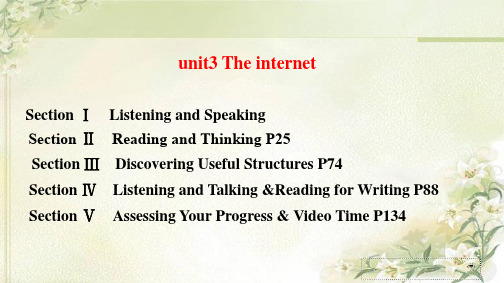
学以致用 完成句子 (1)他整个下午都在上网和朋友聊天。 He has been on the computer all afternoon,chatting with his friends . (2)我和她闲聊了好久。 I had a long chat with her.
3.【教材原文】And so I use a nonsense name for my net identity.(Page 27)
(4)A working party has been set up to look into the problem.
(5)Looking at these photos,I can’t help looking back on my childhood.
(6)She is looked on as the leading figure on the subject.
语境领悟
(1)At last things were beginning to look up. 情况终于开始好转了。
(2)I looked up the new word in the dictionary. 我在词典里查过这个生词。
(3)I look on her as one of my closest friends. 我把她看作我最亲密的朋友之一。
我为我的网上身份胡乱用了个名字。 考点identity n.身份;个性
an identity card (ID card)身份证 identify vt. 认出;确认 identification n. 识别;鉴定;确认
语境领悟
(1)Before checking in for your flight,you must show your identity card.
新人教版-必修二-Unit-3-The-Inter课件
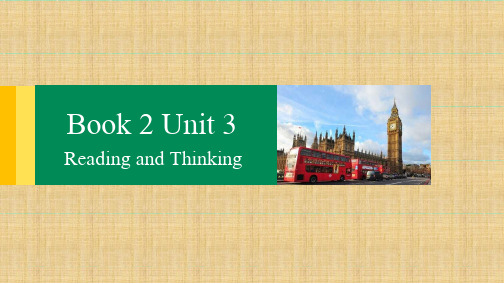
( 三)文本语言分析 语言知识
文本材料涉及什么样的语言知识?
词汇 : wonder
countless cash surf benefit
update download software database quit inspire
bridge charity tough convenient
短语: develop an illness have access to digital divide apply for updated information download software online community social net work keep sb. company collect money pay for star an online company take classes bridge the digital divide go through tough times
.
语言技能
文本的呈现形式是什么?
本课文本的呈现形式是文本阅读的形式,这部分属于 语言输入。在学生们阅读完文本后,学生们要对一些观点 形成认识并发表自己的思路和理解、看法,这部分又属于 语言输出。本课主要涉及的语言技能有阅读、对文章的理 解、分析和语言表达。
认知策略
文本材料的处理需要哪些认知策略? 从阅读过程来看,首先是要求学生浏览文章标题, 根据
More examples you know:
读中:
Activity 3. List the ways in which the text says the Internet has changed people’s lives. Try to add more examples.
人教版必修第二册Unit3 单元语法详解课件
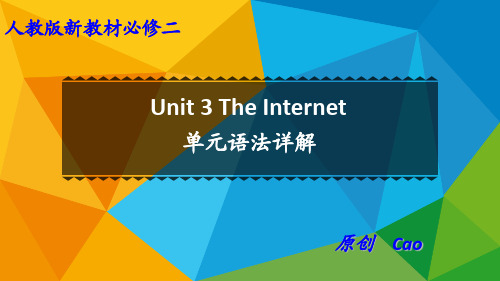
Unit 3 The Internet
单元语法详解
原创 Cao
本单元引入一个新的重要语法内容
——现在完成时的被动语态
让我们一起认识它,了解它,掌握 它,并最终熟练地使用它
◆原句再现
1.Much has been written about the wonders of the world
(solve动作已经完成, 而且 problem 与 solve之间为被动关系)
d. All the rice in the bowl has been eaten up.
(eat动作已经完成, 而且 rice 与 eat之间为被动关系)
◆ 现在完成时的被动语态的主要用法
●表示过去一个被动的动作或状态,一直持续到现在,并有 可能持续下去,常与 for, over, in the past … years或 since引 导的时间状语连用,或常见于“How long....?”句型中。请观 察以下句子
1.This book has already been translated into French.
2. We haven’t been told the date of the meeting so far.
3. Has the machine been repaired yet?
4. How many years has the computer been used till now?
(clean 动作已经完成, 而且 room 与 clean 之间为被动关系)
b. These vegetables have been watered, so we can go home.
(water动作已经完成, 而且 vegetables 与 water 之间为被动关系)
人教版BOOK 2 Unit 3 Computers
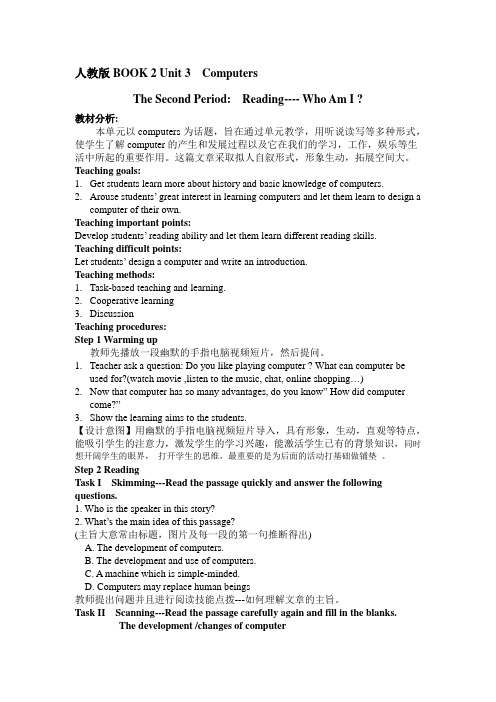
人教版BOOK 2 Unit 3 ComputersThe Second Period: Reading---- Who Am I ?教材分析:本单元以computers为话题,旨在通过单元教学,用听说读写等多种形式,使学生了解computer的产生和发展过程以及它在我们的学习,工作,娱乐等生活中所起的重要作用。
这篇文章采取拟人自叙形式,形象生动,拓展空间大。
Teaching goals:1.Get students learn more about history and basic knowledge of computers.2.Arouse students’ great interest in learning computers and let them learn to design acomputer of their own.Teaching important points:Develop students’ reading ability and let them learn different reading skills. Teaching difficult points:Let students’ design a computer and write an introduction.Teaching methods:1.Task-based teaching and learning.2.Cooperative learning3.DiscussionTeaching procedures:Step 1 W arming up教师先播放一段幽默的手指电脑视频短片,然后提问。
1.Teacher ask a question: Do you like playing computer ? What can computer beused for?(watch movie ,listen to the music, chat, online shopping…)2.Now that computer has so many advantages, do you know” How did computercome?”3.Show the learning aims to the students.【设计意图】用幽默的手指电脑视频短片导入,具有形象,生动,直观等特点,能吸引学生的注意力,激发学生的学习兴趣,能激活学生已有的背景知识,同时想开阔学生的眼界,打开学生的思维,最重要的是为后面的活动打基础做铺垫。
人教高中英语必修2Unit3 Warming up and reading课件
animals
places
Tibet 西藏
rare 少见的
Zimbabwe 津巴布韦
rain forest
They are in danger.
existing animal
endangered animal
Part 2
A guessing game
Who am I?
Who am I?
• I lived on the eath many years ago;
(pair work)
We should stop We should build k_il_li_ng_t_h_em__fo_r_fo_o_d_. ______________
cut down
We should stop ______________
pollute
We shouldn’t ____________
different kind of dinosaurs and a
number of them used to live in __C_h_in_a__.
The eggs of _t_w_e_n_t_y_-f_iv_e species(种类) have been found in _X_i_xi_a_ County,
pollution
homeland / habitat was
destroyed
……
It’s time for humans to show them our hands and protect them!
as dead as a dodo 心如死灰
What should we do to protect animals?
be born or come into
人教版高中英语 必修二 Unit3 《Computers Reading》 课件 (共25张PPT)
Parents’ view on mobile phone Smart phones
Debate show
Should we use smart phones in school?
Rules: • One student one point • Stand up to express your idea • Loudly • Clearly
Homework
1. Read the passage fluently after class; 2. Finish <名校学案> reading.
Mobile/cell phone
I am an electronic machine that can store, organize and find information, do calculations and control other machines. My nickname is “PC”.
13、He who seize the right moment, is the right man.谁把握机遇,谁就心想事成。2021/8/122021/8/122021/8/122021/8/128/12/2021 •14、谁要是自己还没有发展培养和教育好,他就不能发展培养和教育别人。2021年8月12日星期四2021/8/122021/8/122021/8/12 •15、一年之计,莫如树谷;十年之计,莫如树木;终身之计,莫如树人。2021年8月2021/8/122021/8/122021/8/128/12/2021 •16、教学的目的是培养学生自己学习,自己研究,用自己的头脑来想,用自己的眼睛看,用自己的手来做这种精神。2021/8/122021/8/12August 12, 2021 •17、儿童是中心,教育的措施便围绕他们而组织起来。2021/8/122021/8/122021/8/122021/8/12
人教版必修第二册Unit3 Reading and Thinking 公开课课件
Ⅱ While-reading
Enjoபைடு நூலகம் reading
While-reading: Reading for details
We learn that when we go through tough times, we can find help and support from other people online. We also learn that we can feel less lonely by creating or joining communities on the Internet, and that we can even use the Internet to achieve our goals.
Unit 3 The Internet Reading and thinking
目 录 页
contents
Ⅰ Pre-reading Ⅱ While-reading
Ⅲ Post-reading
Ⅳ Language Points Ⅴ Homework
Ⅰ Pre-reading
Pre-reading: Start an online community
While-reading: Reading for details
Read the text again and work in groups to sum up the main ideas of each paragraph.
Para. 1 2 3 4 5
英语必修二unit3教案
英语必修二unit3教案【篇一:高中英语必修二第三单元reading教学设计】 12345【篇二:高一人教课标必修2unit3 computers全单元的教案】period 1 readingthe general idea of this period:this period includes warming up,reading and comprehending of unit 3.it introduces the history and development of computers.from this period the students will learn more about computers.meanwhile they can learn some reading strategies such as skimming and scanning.teaching aims:1.train the students’ reading ability.2.learn some useful words and expressions.3.learn more about computers.teaching important points:2.learn how to use some important words and phrases in this passage.teaching difficult points:1.how to help the students improve their reading ability and understand the passage better.2.learn how to use some important words and phrases in this passage.teaching methods:1.skimming the passage to get the general idea of the text.2.scanning to get the details from the passage.3.explanations and practice to help the students master some language points.4.discussion to help the students understand better what they’ve learned and to use the knowledge they’ve learned in this period.teaching aids:1.a tape recorder.2.a multimedia.teaching procedures:step 1 warming up1.greeting the students as usual.2.introduce the topic of computersshow the five pictures (an abacus,a huge computer,a calculator,a pc,a notebook computer)and get the students name them in english.through this task,students can have a general idea about what they are going to learn.besides,students are expected to have a discussion about what they have in common while looking at them.and they are required to use the given expressions in their discussion to express their ideas.t:boys and girls,today i am going to introduce some machines to you.now let’s see whether you c an name them in english correctly,and talk about them.now work together with your partners and try to find out what they have in common.two minutes late,five students are asked to talk about them in class.s1:an abacus is an old calculating machine used in china until now.s2:a huge computer is built to solve some mathematical problems.but,in my opinion,it is too big.s3:a calculator is a new calculating machine which can solve a large number mathematical problems.and i think it is very convenient to carry and use,so we often use it.s4:a pc is a personal computer,which can solve all kinds of problems and is widely used in offices,schools,shops,at homes,etc.now.s5:a notebook computer is a kind of useful computer which can be taken conveniently like a notebook.but i think it is too expensive.t:quite good.it seems that you are all quite familiar with these machines.but can you tell what they have in common?any volunteers?s6:let me try.i think they all calculate something.they candeal with some maths problems. s7:i believe that they are our good friends.with their help we can finish our work quickly. s8:the 21th century is the century of information technology.as middle school students,we should try to learn how to use computers.t:well,your opinions are all right.indeed,these machinesall can calculate something.what’s more,from the abacus to the notebook computer,there is a long way.but nowcomputers have already changed our lives greatly.but do you know more about computers and can you say something about how computers have changed our lives.step 2 pre-readingshow the questions on the screen.t:now,please have a discussion first,and then i’ll asksome students to report your work.after a few minutes.t:now,who would like to answer the firstquestion?volunteer!s9:i’ll have a try.i know that computers have developed from large machines.they have been made smaller and smaller,but work faster and faster.i really can’t imagine what they will belike and whether they can take the place of human beings inthe future.t:yes,this is really a big problem.i think you are allinterested in computers,you may go on studying computers,and perhaps one day you will design your own computers and become the masters of computers.ok!next question!s10:i think computers have changed our lives greatly.we use computers widely in our study,in our work.you are using the computer to teach us english,aren’t you?s11:in my opinion,in the modern society,using the computers means grasping a tool of controlling the world.we may communicate with each other from a very long distance.in short,we can not live freely without them.t:i agree with you.the computers are becoming more andmore important in our lives.but learning more about computersis also important,isn’t it?ok,let’s come to the reading passage “who am i”.step 3 readingtask 1.skim the passage for the general idea.t:boys and girls,you will be given two minutes to skim the passage and try to find out who “i” am and get the general idea of this passage.after two minutes.t:time is up.who would like to tell us who “i” am and give the general idea of the text to the class?volunteer!s12:of course,“i” am the computer.the passage is mainly about the history and development of computers.s13:the passage is also about the relationship of computers and humans.task 2.scan for the details.t:boys and girls,you will be given two more minutes to scan the passage and try to find out the answers to the following questions.let’s see who can find out the answers most quickly and correctly.1.where were you in 1642?2.what happened to you in 1822?3.what were you called in 1936?4.what did you get in the 1960s?5.what happened to you in the 1970s?t:have you finished?s14:i have.i was in france as a calculating machine in 1642.in 1822,i was built as an analytical machine by charles babbage.i was called “a universal machine” in 1936,as i could solve any mathematical problem. in the 1960s,i was given a family connected by a network,so that i could share information with others and we could talk to each other.in the 1970s,i was brought into people’s homes.t:you are so quick-minded that in such a short time you could find out all the answers to the questions.your mind really works like a computer!step 4 comprehendingtask 3.fill in the timeline to remember the facts.t:but can you memorize facts like a computer?i am afraid you can not.but let’s try to remember the facts in the passage by filing in the timeline on page 19,which,i am sure,will help you remember the facts easily.suggested answers:t:have you finished?if so,please check your answers yourself.i’m sure all of you have got them right.now you can retell the history of computers easily with the help of the timeline,can’t you?please have a try,boys and girls!step 5 homework1.recite the key sentences.2.prepare for learning about language.3.try to retell the text using about 100 words.step 6 the design of the writing on the blackboard unit 3 computers period 1the general idea of the text: questions 1.where were you in 1642? 2.what happened to you in 1822? 3.what were you called in 1936? 4.what did you get in the 1960s? 5.what happened to you in the 1970s?language points:1.in common/have... in common (with)...2.in one’s opinion3.deal with4.simple-minded5.“as” and “with”6.“there were times when... ”step 7 record after teachingperiod 2 learning about languagethe general idea of this period:this period includes revision of the text、learning about language.from this period the students will learn how to use some of the key words and expressions in the text and do some exercises for consolidation,and learn how to use the present perfect passive voice.teaching aims:1.help the students to learn to use some useful words and expressions.2.enable the students to learn how to use the present perfect passive voice.teaching important point:the use of the present perfect passive voice.teaching difficult points:how to master the usages of some important words and phrases and the present perfect passive voice.teaching methods:1.task-based learning.2.cooperative learning.3.explanation and practice.teaching aids:1.a tape recorder.2.a multimedia.teaching procedures:step 1 revisiont:boys and girls,in last period we learned something about the history and development of computers.now who would like to retell the text with the help of these figures?s1:let me try.in 1642,a calculating machine was used in france.then in 1922,the analytical machine was made by charles babbage.it could follow instructions from cards with holes.in 1936,alan turing,the real father of computers,wrote a book to describe how computers could be made to work and built a “universal machine” to solve any mathematical ter,people discovered the computer had “artificial intelligence”.in the 1960s,the computer got his new transistors.its size was totally changes at that time.and in the early 1960s,the first family of computers were connected to each other.in 1970s,computers have brought into people’s homes.now computers have been used by billions of people to deal with information and communicate with each other around the world by the internet.t:congratulations!you’ve done very well.now try to do the same to your partners,ok! step 2 words and expressionstask 1t:please turn to page 19 and finish discovering useful words and expressions.at first,look at ex.1.from the readingpassage,find the words and expressions with the following meanings.now,ten students will be asked to give thewords.who can?volunteers!check the answers together.task 2.t:well done.now please look at ex 2.and complete the passage with some of the words above.pay attention to the use and the forms of those words.the possible answers:network so thatwent by totally truly simple-minded anyway deal withtask 3t:please finish ex.3.look at the sentences on page 20.tick the right word.then some of you will be asked to read the sentences one by one.the possible answers:1.life totally changed when i went to university.2.i was amazed to find that i won the competition to design a new computer.3.the competition was so exciting that we cheered all evening.4.i was so excited at the thought of meeting yang liwei that i could not sleep.【篇三:人教版高中英语必修二第三单元教学设计】《多媒体课件制作与使用技术》课题:the olympic games姓名: mia dong 学号: 17 专业:英语班级: 4 课程名称:多媒体课件制作与使用技术学期:2012至 2013学年第二学期人教版高中英语必修二第三单元《the olympic games》教学设计mia dong 外语系 4班 17一、学情分析(一)学习者分析1、一般特征:学生基本上来自农村,英语水平参差不齐,学习压力大;学习策略与方法不合理,有的学生还不喜欢英语。
- 1、下载文档前请自行甄别文档内容的完整性,平台不提供额外的编辑、内容补充、找答案等附加服务。
- 2、"仅部分预览"的文档,不可在线预览部分如存在完整性等问题,可反馈申请退款(可完整预览的文档不适用该条件!)。
- 3、如文档侵犯您的权益,请联系客服反馈,我们会尽快为您处理(人工客服工作时间:9:00-18:30)。
① He is so clever a boy that we all like him. such a = He is _________clever boy that we all like him. so many mistakes ② He made ___ ____ that he failed the exam once again.
Step6.Checking (3:57—4:00)
Do the exercises and check the answers together.
1. My friend Martin was very sick with a strange fever; A , he could neither eat nor sleep. A.as a result B. after all C. anyway D. otherwise 2. She was unable to walk____ D the fall from the bike. A.because B. as C. as a result D. as a result of
① It will be + 时间段 + before 主语 + 一般现在时 主将从现
“……多久之后才……” ②It was + 时间段 + before 主语 +一般过去时 “不久就……” 主过从过 ③ It is/has been + 时间段+ since 主语+did “自从……”
6.这个问题很容易解决。
③ She was _____ so excited that she couldn't go to sleep. 她兴奋得睡不着觉。 ④ It was ______ so hot a day ______ that nobody wanted to do anything. (=It was ______ such a hot day _______ that nobody wanted to do anything.)天气如此热,谁也不 想干活。 ⑤I made ______ that my such great progress_______ teacher praised me. 我取得了如此大的进步以至于老师表扬了我。
18
2. Their expenses reached a total ______1,000 pounds. of 他们的花销总额是1000磅。 3. In _______, total there are 3,000 students. 总共有3000个学生。
• 3. Over time my memory has developed so much that, like an elephant, I never forget anything I have been told. (L20) • 随着时间的推移,我的记忆力发展的 如此之快,就像一头大象一样,从来 不会忘记告诉我的任何事情。 • 【句法分析】 • “so…that… (如此……以至于……)” 引导结果状语从句。
(2) so that可引导结果状语从句, 也可引导目的状语从句。 ①引导目的状语从句时,从句中常 使用 can/could/may/might/will/would/ should 等情态动词; ②引导结果状语从句时,从句中一 般不用 can和 may等词,在 so that 前可以有逗号,意思是“因此;所 以”。
Step3 Discussing (3:31—3:40)
1. Check the answers with your group members. 2. Recite the language points .
Step 4 Presenting (3:40—3:48)
1. Present the answers on the blackboard. 2.Recite the second paragraph. (quickly; loudly; clearly)
3. __________________ turn ...into reality 把……变为现实 4. _________________ 结果 as a result
common 与……有共同之处 1. have...in _________________
5. _________________ 在某种程度上 in a way
adj./adv. ① so+ adj. +a/an +单数可数名词 little(少)/much+不可数名词 few/many+复数名词 +that 他是如此聪明的一个小孩以至于学 英语很快。 He is so clever a boy that he can learn English quickly.
a/an +adj.+单数可数 such+ a/an+单数可数名词 +that adj.+复数名词/不可数名词 她是如此诚实的一个女孩以至于每 个 人都信任她。 She is such an honest girl that She is so honest an girl that everybody trusts her. everybody trusts her.
Step 5 Analyzing (3:48—3:57)
Explain the difficult and important language points.
1. As a result I totally changed my shape.(L19) 结果我的形状完全发生了变化。 1)【词汇用法】 as a result “结果,因此”+结果 as a result of “由于……的结果; 作为……的结果”+原因 =because of (result为名词)
as usual 12.___________ 像往常一样
4
●重点句子
1. As time ________, went by I found my English improved. going by , I found = With time ________ my English improved.
result in 导致;造成+结果=lead to result from 起因于……;由…… 导致的 +原因 (result为动词)
1) Hard work ____________ results in success. 努力造就成功。 results from hard work. 2) Success _____________ 成功来自于努力。 3)He was ill. ___________, As a result he didn't go to school. 他生病了。因此,他没去上学。 As a result of his illness, he didn't go 4)_____________ to school. 由于生病,他没去上学。
Unit3 computers
Period4 Reading (2)
作课人:马丽娜 班级:高一(14)班
Step1 Leading-in (3:15—3:18)
Review what we have learnt.
●重点短语
2.___________________ 从……时起 from...on
28
He hurried up so that he could catch the train. 他匆匆赶路为的是赶上火车。 对比: 目的状语从 He hurried up so that he caught the 句 train. 他匆匆赶路,结果赶上了火车。
结果状语从
29
• 高考链接
(09 上海)The Great Wall is ___ tourist attraction that millions of people pour in every year. A.so a well-known B.a so well-known C.such well-known a D.such a well known
Hale Waihona Puke 3. The terrible accident A his carelessness. A.resulted from B. resulted in C. as a result of D. as a result
2.To my surprise, I found I had a lot in common with _____________________Tom. 使我惊讶的是, 我发现我和Tom有 许多共同之处。
3._______________ In common with other students, Tom is seldom late for school. 和其他同学一样,汤姆很少上学 迟到。
26
练一练: was he that he couldn’t So angry _______ say a word. 他是如此生气以至于说不出来一句 话。 he that we Such a lovely boy is ______ all love him. 他是个如此可爱的男孩以至于我们 都喜欢他。
16
• 高考链接 (09 全国)Jenny
nearly missed the flight___doing too much shopping. A.as a result of B.on top of C.in front of D.in need of
2)【词汇用法】 total adj. 总的;全部的;整个的 n.总数;合计 v 总数达;共计 totally adv. 完全地;整个地 ________ ______ in total总共;总计(=in all) a total of 总数;总共 练一练: 1.I _______agree with you. totally
